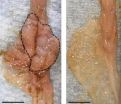(Press-News.org) BOSTON – A drug that unleashes the immune system to attack cancer can produce lasting remissions and hold the disease in check – for more than two years, in some cases – in many patients with advanced melanoma, according to a new study by researchers at Dana-Farber Cancer Institute, Johns Hopkins University, Yale University, and allied institutions.
The study, published online today, March 3, by the Journal of Clinical Oncology, provides the longest-term look so far at how melanoma patients have fared since receiving the drug, nivolumab, in a phase I clinical trial. The results indicate that the benefits of nivolumab not only occur quickly but can persist, even in some cases where use of the drug is discontinued.
The clinical trial involved 107 patients with advanced melanoma that no longer responded to other treatments. They received nivolumab intravenously every other week for up to 96 weeks. After one year, 62 percent of the patients were alive. After two years, 43 percent were alive.
"These are striking results for patients with metastatic melanoma," said the study's senior author F. Stephen Hodi, MD, director of the Melanoma Treatment Center at Dana-Farber. "This study provides the first demonstration of the long-term benefits this treatment approach can produce."
Nivolumab is one of a new generation of drugs that essentially releases the brakes on an immune system attack on cancer. The drug blocks PD-1, a protein on immune system T cells that restrains them from leading a charge on tumor cells. By interfering with PD-1, nivolumab allows the attack to proceed.
The side effects of the treatment were consistent with those observed in previous studies of the drug. The most common adverse experiences were fatigue, rash, and diarrhea, most of which occurred in the first six months of therapy. Prolonged exposure to the drug didn't produce cumulative negative effects, the investigators report.
One of the most noteworthy findings of the study is that, in many patients, tumors either remained the same size or continued to recede even after the treatment period was over. "This suggests that blockade PD-1 may reset the equilibrium between the immune system and the tumor, keeping tumor growth in check," remarked Hodi, who is also the director of the Center for Immuno-Oncology at Dana-Farber.
Another intriguing discovery is that overall survival times for patients in the trial were considerably longer than the periods in which the disease did not worsen. In other words, even in patients who developed small new melanoma growths after treatment, the disease often remained under control. That is far different from the usual sequence of events, in which the appearance of new growths often heralds a full-scale return of the disease, Hodi said.
The effectiveness of nivolumab in these patients suggests that combining the drug with other immune system-based therapies may prove even more potent, the authors indicate. Clinical trials are already under way to assess such a combined approach.
INFORMATION:
The lead author of the study is Suzanne Topalian, MD, of the Sidney Kimmel Comprehensive Cancer Center at Johns Hopkins. Co-authors are
William Sharfman, MD, Julie Brahmer, MD, Evan Lipson, MD, Janis Taube, MD, and Drew Pardoll, MD, PhD, of Johns Hopkins; Mario Sznol, MD, and Harriet Kluger, MD, of Yale University School of Medicine; David McDermott, MD, of Beth Israel Deaconess Medical Center; Donald Lawrence, MD, of Massachusetts General Hospital; Richard Carvajal, MD, of Memorial Sloan-Kettering Cancer Center; Michael Atkins, MD, of Georgetown-Lombardi Comprehensive Cancer Center, Washington, D.C.; John Powderly, MD, of Carolina BioOncology Institute; Philip Leming, MD, of Christ Hospital Cancer Center, Cincinnati, Oh.; Igor Puzanov, MD, and Jeffrey Sosman, MD, of Vanderbilt University Medical Center; David Smith, MD, of the University of Michigan; and Jon Wigginton, MD, Georgia Kollia, PhD, and Ashok Gupta, PhD, of Bristol-Myers Squibb.
Funding for the study was provided by Bristol-Myers Squibb.
About Dana-Farber Cancer Institute
Dana-Farber Cancer Institute is a principal teaching affiliate of the Harvard Medical School and is among the leading cancer research and care centers in the United States. It is a founding member of the Dana-Farber/Harvard Cancer Center, designated a comprehensive cancer center by the National Cancer Institute. It provides adult cancer care with Brigham and Women's Hospital as Dana-Farber/Brigham and Women's Cancer Center and it provides pediatric care with Boston Children's Hospital as Dana-Farber/Boston Children's Cancer and Blood Disorders Center. Dana-Farber is the top ranked cancer center in New England, according to U.S. News & World Report, and one of the largest recipients among independent hospitals of National Cancer Institute and National Institutes of Health grant funding. Follow Dana-Farber on Facebook: http://www.facebook.com/danafarbercancerinstitute and on Twitter: @danafarber.
Immune system-based therapy produces lasting remissions in melanoma patients
2014-03-04
ELSE PRESS RELEASES FROM THIS DATE:
Every step you take
2014-03-04
Artificial photosynthesis, in which we emulate the process used by nature to capture energy from the sun and convert it into electrochemical energy, is expected to be a major asset in any sustainable energy portfolio for the future. Artificial photosynthesis offers the promise of producing liquid fuels that are renewable and can be used without exacerbating global climate change. A key to realizing commercial-scale artificial photosynthesis technology is the development of electrocatalysts that can efficiently and economically carry out water oxidation reaction that is ...
Eliminating bacteria, changing lifestyle could lower risk in people genetically susceptible to color
2014-03-04
New York, NY— Bacteria in the gut are essential for the development of intestinal tumors in mice, according to research led by investigators from the Icahn School of Medicine at Mount Sinai. Removing the bacteria may play a critical role in reducing cancer risk, the researchers write, in the March issue of the Journal of Experimental Medicine.
Sergio A. Lira, MD, PhD, Director of the Immunology Institute, and Professor of Immunology and Medicine, and his laboratory at the Icahn School of Medicine at Mount Sinai, used a transgenic mouse model to test the hypothesis that ...
Voters using smartphones made fewer errors in mock election
2014-03-04
Voters who cast their ballots via smartphones made fewer errors than they did when voting via traditional methods in a mock election, according to new research from psychologists at Rice University.
In a first-of-its-kind study, co-author Rice Professor of Psychology Michael Byrne examined how smartphone-based voting systems can be incorporated into the current large-scale voting process. The study, "Toward More Usable Electronic Voting: Testing the Usability of a Smartphone Voting System," found that while there are no consistent differences in efficiency and perceived ...
Native American city on the Mississippi was America's first 'melting pot'
2014-03-04
CHAMPAIGN, Ill. — New evidence establishes for the first time that Cahokia, a sprawling, pre-Columbian city situated at the confluence of the Missouri and Mississippi rivers, hosted a sizable population of immigrants.
Cahokia was an early experiment in urban life, said Thomas Emerson, who led the new analysis. Emerson is Illinois state archaeologist and the director of the Illinois State Archaeological Survey at the University of Illinois.
Researchers have traditionally thought of Cahokia as a relatively homogeneous and stable population drawn from the immediate area, ...
Researchers discover how soils control atmospheric hydrogen
2014-03-04
Researchers at New Zealand's University of Otago are helping to clear up an enduring mystery regarding the composition of the Earth's atmosphere. They have discovered the microbial soil processes that help ensure that the explosive gas hydrogen remains at trace levels.
In recent decades it was found that around four-fifths of all hydrogen released into the air is rapidly removed through soil activity, but exactly what is recycling it, and how, has remained unclear.
Now, Otago scientists have shown that the soil bacterium Mycobacterium smegmatis uses two special enzymes ...
Increased intake of fish can boost good cholesterol levels
2014-03-04
Increasing the intake of fatty fish increases the number of large HDL particles, according to a recent study completed at the University of Eastern Finland. People who increased their intake of fish to a minimum of 3–4 weekly meals had more large HDL particles in their blood than people who are less frequent eaters of fish. Large HDL particles are believed to protect against cardiovascular diseases. The results were published in PLOS ONE.
The consumption of fish has long been know to be beneficial for health; however, the mechanisms by which fats and other useful nutrients ...
Liver metabolism study could help patients awaiting transplants
2014-03-04
In a new study that could help doctors extend the lives of patients awaiting liver transplants, a Rice University-led team of researchers examined the metabolic breakdown that takes place in liver cells during late-stage cirrhosis and found clues that suggest new treatments to delay liver failure.
More than 17,000 Americans are awaiting a liver transplant, and of those, about 1,500 will die this year while still waiting, according to the American Liver Foundation. The new research, which appeared online Feb. 27 in the Journal of Hepatology, suggests new treatments that ...
Homing in on cancer with a comprehensive measurement method
2014-03-04
Cancer is the second most common cause of death in Switzerland. There are many reasons why in the era of cutting-edge medicine it is still difficult to cure this disease. A tumour may, for instance, consist of different tumour cell subpopulations, each of which has its own profile and responds differ-ently to therapy – or not. Furthermore, the cancer cells and the healthy cells in the body interact and communicate with one another. How a tumour then actually develops and whether metastases form depends on which signals a tumour cell receives from its environment. With the ...
Relativity shakes a magnet
2014-03-04
The research group of Professor Jairo Sinova at the Institute of Physics at Johannes Gutenberg University Mainz (JGU), in collaboration with researchers from Prague, Cambridge, and Nottingham, have predicted and discovered a new physical phenomenon that allows to manipulate the state of a magnet by electric signals. Current technologies for writing, storing, and reading information are either charge-based or spin-based. Semiconductor flash or random access memories are prime examples among the large variety of charge-based devices. They utilize the possibility offered by ...
Researchers report on discovery to make solar power less expensive and more efficient
2014-03-04
University of Cincinnati researchers are reporting early results on a way to make solar-powered panels in lights, calculators and roofs lighter, less expensive, more flexible (therefore less breakable) and more efficient. Fei Yu, a University of Cincinnati doctoral student in materials engineering, will present new findings on boosting the power conversion efficiency of polymer solar cells on March 3, at the American Physical Society Meeting in Denver.
Yu is experimenting with adding a small fraction of graphene nanoflakes to polymer-blend bulk-heterojunction (BHJ) solar ...




